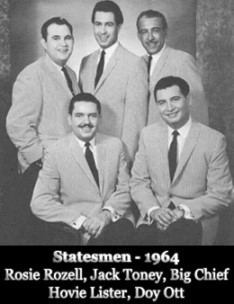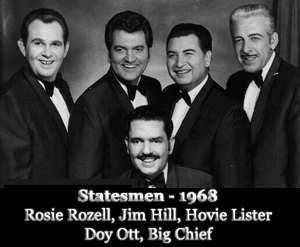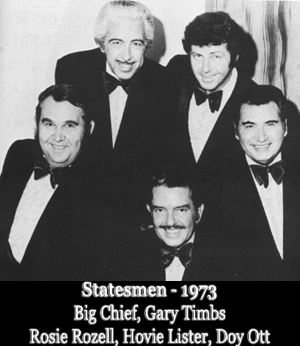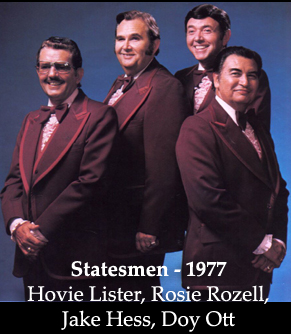 |
Group MembersTenor |
 |
 |
 |
The Statesmen Quartet (1948-1974, 197?-1980, 1988-1989, 1992-2001) (AKA Hovie Lister And The Statesmen)
History
Hovie Lister was known as the first gospel music disc jockey. When Lister learned that Major Howell, Chairman of the Board of the Atlanta Constitution, planned to start radio station WCON in Atlanta, he requested airtime for his his new quartet. Howell gave Lister the airtime and the Statesmen Quartet debuted on WCON radio in October of 1948 with Mosie Lister (lead), Bobby Strickland (tenor), Bervin Kendrick (baritone), and Gordon Hill (bass). In time, transcribed radio programs featuring the Statemen were distributed to more than twenty radio stations throughout the Southeast.
Early Personnel Changes
Mosie Lister was the first to depart the quartet. He continued to write and arranged songs for the group. The man chosen to replace Lister was the same person that had replaced him in the Melody Masters Quartet, Jake Hess. Aycel Soward also replaced Gordon Hill. Soward had been Listerís first choice for the bass singing role when he was forming the group. Circumstances prevented him joining the group in the beginning even though he was in the first publicity picture of the quartet. The Statesmen signed a recording contract with Capitol Records just before James Wetherington was hired to replace Soward.
After a few weeks with the quartet, Lee Roy Abernathy gave Wetherington the nickname ďBig Chief.Ē The quartet composed of Strickland, Hess, Kendrick, Big Chief, and Lister remained intact through the summer of 1950. Bobby Strickland left on September 1, 1950 to form the Crusaders Quartet. Three members of the Melody Masters Quartet were then reunited when Lister hired Cat Freeman to replace Bobby Strickland. Freeman, brother of Vestal Goodman, was a seasoned quartet veteran. Freeman had a strong voice and soon became the clown of the Statesmen Quartet.
When Uncle Sam came calling for Hovie Lister, Big Chief took over the management of the quartet. The most notable change during Chiefís tenure as group manager took place when Doy Ott was hired to play piano. Also during this period, Kendrick left the Statesmen to join Stricklandís Crusaders Quartet. Once Lister returned from military service, he resumed the pianist position and Doy Ott became the baritone for the group. This was a position Ott would hold for many years.
The 1950s: Glory Days
The Statesmen spent countless hours perfecting their craft and molding the sound that would take them to the top of the gospel music world. Several of their more popular renditions were patterned after black gospel arrangements. Hits such as "You Sho Do Need Him Now," "Talk About Jesus," and "Get Away Jordan" all came from black artists of the day. Once the group stabilized with Cat Freeman, Jake Hess, Doy Ott, Big Chief Wetherington, and Hovie Lister, they formed an alliance with the Blackwood Brothers to tour as a team. By the end of the decade, the team was collecting as much as $1500 per performance, an amount unheard of previously. Due to their popularity, the team was able to exercise considerable clout with concert promoters, more or less dictating if, where and when other groups could appear. This lasted until the rise of gospel television shows in the late 1960s gave competing groups wider exposure.
Cat Freeman left the Statesmen as they were reaching the height of their popularity. Lister had always dreamed of having tenor Denver Crumpler in the group. He was able to convince Crumpler to join the Statesmen in 1953. Crumplerís clear voice and good looks made him a natural for the group. The precision attained by this lineup led many music authorities to dub them "The Perfect Quartet."
Shortly after Denver Crumpler joined the quartet, the Statesmen signed a recording contract with RCA Victor records. The quality of their recordings improved with the addition of noted studio musicians like guitarist Chet Atkins who also produced many of their early RCA recordings. This marriage with RCA Victor lasted for nearly fifteen years.† They also recorded a number of songs for the RCA Thesaurus transcription service.
Food giant Nabisco began sponsoring the syndication of the quartetís TV program to other markets. The Statesmen had elaborate sets built for the program and hired the Wade Creager Orchestra, house band for the Biltmore Hotel Ballroom. The group was the first quartet to regularly use an orchestra. Songs were prerecorded in advance. They would then lip-sync the lyrics while being filmed for the program. Lister sold Nabisco saltine crackers and vanilla wafers as the Statesmen sang "merry melodies coming your way, songs of happiness to brighten up your day."
The national media took notice of gospel music in the mid-1950s. On September 6, 1954, the Statesmen Quartet traveled to New York City to make their live national television debut on Arthur Godfrey's Talent Scouts. They performed "This Ole House" and won the competition.
Jake Hess left the quartet in late 1956 to start a new business venture. Les Roberson, formerly a member of the Weatherfords and the Oak Ridge Quartet replaced Hess. Roberson was a natural baritone, but he tried valiantly to fill the lead singerís role. This change in personnel was a big blow to the Statesmen, but nothing on the scale of what would happen on March 21, 1957. As the Statesmen were preparing to leave for a trip, Lister received a call from Denver Crumpler's wife reporting that Crumpler was quite ill. Although Lister quickly summoned an ambulance, Crumpler passed away at the age of 44.
The death of Denver Crumpler brought about a distinct change in the sound of the Statesmen Quartet. Cat Freeman returned to fill in with the quartet until a permanent replacement could be hired. Freeman ended up staying with the group for over a year. Meanwhile, Les Roberson began experiencing vocal problems so Jake Hess returned to sing lead. This reunited the 1953 version of the Statesmen. Rosie Rozell from Tulsa, OK was ultimately hired to fill the tenor role. Rozell brought an emotional vocal style to the quartet.
After Rozell joined the group, the Statesmen produced an album for their own Statesmen label titled Get Away Jordan which quickly became one of their biggest sellers. It was also one of the first to be released on the new Skylite label, a company that the Statesmen and Blackwood Brothers owned jointly.
The 1960s: Lead Singer Roulette and More TV Shows
During the 1960s, songs like "Iíve Found a New Way," "I Shall Not Be Moved," "Without Him" and "Oh What A Savior" were popular songs for the Statesmen. In 1963 Jake Hess left the Statesmen to form the Imperials. Hess had been the cornerstone around which the Statesmen sound had been formed for 15 years. Jack Toney was the man ultimately hired to replace the popular Hess. Although Toney was a young man, he had years of gospel music experience and an excellent voice. Toney did well singing Statesmen classics originally made popular by Hess, but his forte was the new songs he brought to the group such as "Ship Ahoy" and "Beyond the Gates."
In the mid-1960s, the Statesmen began appearing with the Blackwood Brothers on a syndicated gospel music television program called Singing Time in Dixie. This program featured the two quartets along with many other top groups. Most of the featured groups on the program recorded for the Skylite label, which was owned by Statesmen-Blackwood Enterprises.
The Statesmen released a number of recordings on the RCA Victor label during the 1960s. One of their biggest recordings was actually released on RCAís budget label, RCA Camden. The project was titled All Day Singing and Dinner on the Ground. The Goss Brothers were hired to provide background instrumentation, and the recording was nominated for a Grammy Award.
Roy McNeal followed Toney with the Statesmen. McNeal had formerly sung first tenor with the Rangers Trio and would later assumed that position with the Stamps Quartet. During his tenure with the Statesmen, the quartet was able to pitch their harmonies higher due to McNeal and Rozellís similar vocal ranges. After several months, McNeal returned to his former position as lead singer with the Prophets and Jack Toney returned to the Statesmen.
After Toney returned to the fold, the group launched another television program. The new show called Glory Road was recorded in color, which was an emerging innovation at the time. The program featured the Statesmen and the Blackwood Brothers with one guest group on each 30-minute show. Toney continued to sing lead with the Statesmen until 1968. After that, Don Butler filled in until Jim Hill, another established first tenor, was hired to fill the lead singer position.
Much like the situation when Jack Toney joined the Statesmen, Hill developed his style to suit the old Statesmen standards such as "Oh My Lord What a Time" and "Faith Unlocks the Door." He joined Rozell, Ott, Big Chief and Lister and recorded one of their most popular albums, Thanks to Calvary. Included on that album was one of Hill's most popular songs, "For God So Loved."
Soon after Hill joined the Statesmen, Rosie Rozell left the quartet to join the Searchers. The Statesmen Quartet hired Sherrill Nielsen to replace Rozell. Nielsen had been the original first tenor with the Imperials. His Irish tenor voice allowed the Statesmen to recreate some of the sounds from the Crumpler years. Nielsen also brought new songs to the group including "The Impossible Dream" and "Gonna Shout Hallelujah.Ē
The 1970s and 1980s: New Trends and Ultimate Disbanding
The Statesmen Quartet adopted a more youthful sound in the 1970s with the addition of Nielsen and bass guitarist Tim Baty. Their appearance changed as well as they began to dress in polyester suits with open collars. Gary Timbs joined the Statesmen to play organ. He would sometimes leave the organ bench to join Nielsen and Baty as they performed a few numbers on the Statesmen programs. Timbs later replaced Hill in the lead vocalist position. His version of "That's Enough" became a hit for the group, and his boogie-woogie piano style and repartee with Lister thrilled audiences. Nielsen and Baty left the Statesmen and joined forces with Donnie Sumner to form Voice, a trio that became part of Elvis Presleyís entourage.
After Nielsen left, Rosie Rozell returned to the Statesmen for a short time. This aggregation revived several Rozell classics including "Oh What a Savior" and "You Gotta Walk that Lonesome Road," but they never made any commercial recordings.
Big Chief Wetherington developed a few medical problems in the early 1970s that required him to miss several months of touring. He was with the group on Tuesday night, October 2, 1973 in Nashville at the National Quartet Convention. The crowd reacted with enthusiasm as the Statesmen performed and Big Chief was featured on "Why Me Lord." He also performed a recitation during "The Lighthouse." The following day while the group was still in town for the convention, Wetherington suffered a massive heart attack and did not recover. He passed away on October 3, 1973
The death of Big Chief Wetherington was a devastating blow, and the Statesmen never truly recovered. Wetherington had been the foundation of the groupís sound for two decades. Soon after Wetherington passed away, Rozell left the Statesmen. Willie Wynn of the Oak Ridge Boys was hired to replace Rozell and Ray Burdett joined the group to sing bass. Kenny Hicks, formerly of the Stamps and Rebels, joined the group as bass guitarist. They also employed a drummer, a lead guitarist, and a steel guitarist in hopes of updating their sound. Noted songwriter Elmer Cole joined the group for a few months, as did Wayne Hilton and David Will. In November of 1974 after performing at the Atlanta All-Nite Sing, Lister announced the group was retiring. Willie Wynn soon formed the Tennesseans.
The Statesmen returned in 1977 with a lineup consisting of Jake Hess, Rosie Rozell, Doy Ott and Hovie Lister (no bass singer). Ott left the following year, and was replaced by Jake Hess' son Chris. Both Jake and Chris Hess left in 1979 and were replaced by Buddy Burton and Ed Hill. Bass singer Tommy Thompson was also hired in 1979.
In late 1980, Hovie Lister and JD Sumner formed the Masters V as a part-time group. In a January 1981 Singing News article, Hovie declared that the appearances by the Masters V would not spell the end of the Statesmen Quartet, but they dissolved a few months later. The last few concerts that were billed as the Statemen featured the existing members of the Masters V with the exception of James Blackwood (Rosie, Jake, JD, and Hovie with Richard Coltrane filling the baritone spot).
The Return Of The Statesmen
After Jake Hess left the Masters V in 1986, he performed billed as Jake Hess & Friends. By 1988, the "friends" appearing with Hess included former Statesmen members Rosie Rozell, Buddy Burton, and Tommy Thompson. When the Masters V dissolved in 1988, Hovie Lister was added and they made a few appearances that fall and winter as the Statesmen. This version of the group was short-lived because Jake Hess had obligations to his record label Genevox. In early 1989, Hovie Lister joined the Palmetto State Quartet and the Statesmen name was again dormant.
In 1992, Hovie Lister and Jake Hess returned with a new version of the Statesmen that included Biney English (lead/baritone), Johnny Cook (tenor), and Bob Caldwell (bass). This group made three recordings (Revival, Oh What A Savior, and O My Lord, What A Time). Lister credits Bill Gaither with inspiring him to bring the Statesmen back in 1992.
Hess was only with the group a short time before health concerns forced him to retire from the road. As he had done years before, Jack Toney replaced Hess. This time, Toney would remain with the Statesmen until the group name was retired at Listerís death in 2001. Other members of the Statesmen during their final decade included Mike Loprinzi, Rick Fair, Wallace Nelms, and Doug Young. Although they werenít particularly successful on radio, the group continued to thrill audiences across the country with their classic style and Listerís charm as the groupís emcee and pianist. Lister and the Statesmen were frequent guests on the Gaither Homecoming videos and regularly appeared at events like the National Quartet Convention and the Grand Ole Gospel Reunion.
Awards
GMA Hall Of Fame (1998)
Discography
Due to the large number of projects recorded by the Statesmen, the discography section has been divided into separate pages by decade. Please click on the links below for the decade you wish to view.
1950s 1960s 1970s 1980s 1990s 2000s
Also see individual group members for solo projects.
